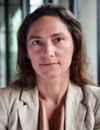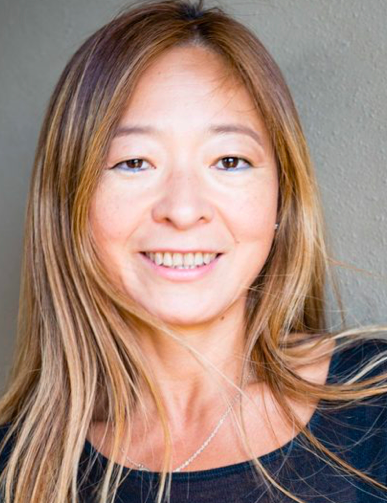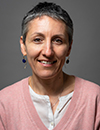| Conferences > Point-of-Care, Biosensors & Mobile Diagnostics Europe 2020 > Keynote Speakers |
| Register | Login |
Jonathan CooperThe Wolfson Chair of Bioengineering, University of Glasgow Professor Jon Cooper holds The Wolfson Chair in Biomedical Engineering. He is an EPSRC Research Fellow and holds a European Research Council Advanced Programme Grant. His major research interests are in ultrasonics, microfluidics and medical diagnostics. He has a track record of spin-out and translation of devices into practice. In one example, he is developing, rapid, zero-cost “origami paper” diagnostics species-specific DNA sensors to identify the cause of infectious disease and inform treatment “in the field” in Asia, India and Africa for point of care testing of infectious diseases in humans and animals from blood, sperm and faecal samples. He was elected as a Fellow of the Royal Academy of Engineering (UK’s national academy of engineering) as well as a Fellow of the Royal Society of Edinburgh (Scotland’s National Academy of arts, humanities and sciences). |
Emmanuel DelamarcheManager Precision Diagnostics, IBM Research - Zürich Dr. Delamarche is currently leading activities on Precision Diagnostics at IBM Research - Zürich with the goal of using expertise in micro/nanotechnology, physics and biochemistry for solving important problems in biology and medicine. One of his main projects deals with the development of portable and precise diagnostic devices using microfluidic concepts and smartphones. In addition to his research, he is also a Lecturer at ETH Zurich and a contributor to scientific panels for grant agencies and governments. He published over 120 papers and is co-inventor on more than 70 patent families. He has received numerous awards from IBM, was named “Master Inventor” by IBM, and received the Werner prize of the Swiss Chemical Society in 2006. |
Lorena DiéguezLeader of the Medical Devices Research Group, INL- International Iberian Nanotechnology Laboratory Lorena Diéguez joined INL in 2014 as a Staff Researcher and is, since 2018, the leader of the Medical Devices research group. Her research is mainly devoted to Translational Medical Research in close collaboration with hospitals and focuses on the development of tools and solutions based on microfluidics, biosensors and nanotechnology towards early diagnosis and better understanding of diseases. She is also very interested in translating her technology from the lab to the clinic and is co-founder and CEO of the spin-off company RUBYnanomed in the field of liquid biopsy. Currently, she is also the Chair of the Working Group in Medical Devices at the ETPN (European Technology Platform in Nanomedicine). She obtained her Bachelors in Physics with a Major in Optoelectronics at the University of Santiago de Compostela in 2005, then completed her Masters in Nanotechnology at the University of Barcelona (UB) in 2007 and her PhD in Biosensors at the UB, the Institute for Bioengineering of Catalonia and the ETH Zürich. Her postdoc at the University of South Australia (2010-2013) was devoted to the study of rare cells from biological samples using microfluidics. |
Jason HeikenfeldProfessor and VP Operations, UC Office of Innovation, University of Cincinnati Jason Heikenfeld is VP of Operations at the Univ. of Cincinnati Office of Innovation. He also directs the Novel Devices Laboratory, an internationally leading lab in electronic display technology, microfluidics, electronic paper, and most recently minimally invasive biosensing technology. In the first decade of his career, Jason Heikenfeld is VP of Operations at the Univ. of Cincinnati Office of Innovation. He also directs the Novel Devices Laboratory, an internationally leading lab in electronic display technology, microfluidics, electronic paper, and most recently minimally invasive biosensing technology. In the first decade of his career, Dr. Heikenfeld had already accumulated the most patents and licensees of any faculty member in the history of the Univ. of Cincinnati. He is a serial entrepreneur, and one of his recent startups, Eccrine Systems, has been recognized as a top 50 global startup by Bloomberg. In addition to his scholarly work, during his teaching years Prof. Heikenfeld was the highest-rated STEM educator at the University of Cincinnati. |
Regina LuttgeProfessor, Eindhoven University of Technology Regina Luttge investigates and develops microsystems for medicine and biology applying emerging and established micro-nanofabrication methods to control systems’ properties at the nanoscale. Regina studied Applied Sciences in Germany and worked as an engineering researcher at Institut für Mikrotechnik Mainz (IMM GmbH) for nearly five years prior to starting her PhD studies in Microsystems Technologies at Imperial College, London, in 1999. In 2003 she received her PhD from the University of London on the development of fabrication technologies for micro-optical scanners. Switching her research interest to microfluidic systems, Luttge went on to work at the University of Twente’s MESA+ Institute for Nanotechnology, The Netherlands. Initially as a postdoc and later, when she received a Veni award by The Netherlands Organisation for Scientific Research (NWO) as an Assistant Professor in the Mesoscale Chemical Systems group. Receiving her second personal award (ERC Starting grant) by the European Research Council in 2011 empowered her to set up her own research line in microsystems for medicine and biology as an independent PI. In 2013, she moved her research line to the newly started Microsystems section at TU/e, where she was also appointed Associate Professor in the same year. Since 2018, she continuous her research activities within in the Microsystems section as Chair of Neuro-Nanoscale Engineering. Currently, she is the leader of CONNECT, a 5 years EU funded project conducting research to better understand Parkinson’s disease by means of Organ-on-a-Chip (OOC), specific microsystems recapitulating the in vivo microenvironment of human tissues in a dish. Besides education and research, Regina is passionate about spinning off new businesses from her academic activities, encouraging her students at all levels of their educational program to take part in the innovation chain. |
Amy ShenProfessor and Provost, Okinawa Institute of Science and Technology Graduate University Amy Shen is the provost and professor at Okinawa Institute of Science and Technology Graduate University (OIST) in Japan, leading the Micro/Bio/Nanofluidics Unit. Amy's research is focused on microfluidics and lab-on-a-chip devices at the bio/nano-interface, with applications in biotechnology. She is a Fellow of the American Physical Society, the Royal Society of Chemistry, and Society of Rheology. Amy was also a Fulbright Scholar in 2013. She is an associate editor for Soft Matter and serves on the editorial advisory board for ACS Sensors, Journal of Rheology, and Physics of Fluids. |
Winnie Edith SvendsenProfessor, Technical University of Denmark Winnie Svendsen received her BSc degree in 1992 and MSc degree in physics in 1993 from the University College Dublin, Ireland; here, she received the EOLAS applied research award for excellent research. Her PhD was from Copenhagen University and the National Laboratory for Sustainable Energy (RISØ), and was finalized in 1996. In 1996 she accepted a postdoctoral position at the Max Planck Institute for plasma physics. In 1998 Dr. Svendsen received talent stipend from SNF (now FNU) and the prestigious Curie stipend from Copenhagen University to establish a research group to design a hyperpolarized gas set-up for use in medical lung diagnostic. In connection with this project she received funding from the European Fifth Framework to organize a workshop on hyperpolarized gasses. In 1999 she was appointed associate professor at Copenhagen University. Since 2000 Dr. Svendsen has been employed as associated professor at DTU. In 2006 she established her own research group, Nano-Bio Integrated Systems (NaBIS), which integrates micro- and nanoscience in lab-on-chip systems to develop highly sensitive technologies for medical diagnosis and treatment monitoring, as well as environmental monitoring. |
Valérie TalyCNRS Research Director, Professor and Group leader Translational Research and Microfluidics, Université Paris Cité V. Taly is a CNRS research director and group leader of the Translational Research And Microfluidics team within the clinical oncology research unit MEPPOT (personalized medicine pharmacogenomics and therapeutic optimization) in the Cordeliers Research Center (university Paris Cité). Her team performs interdisciplinary researches aiming at developing and validating microfluidic tools for cancer research in close collaboration with clinicians and researchers in oncology and toxicology. Since 2008, she developed droplet-based digital procedures for Cancer diagnosis. Recently, her research has been dedicated to the clinical validation of droplet-based microfluidics for the non-invasive detection of Cancer biomarkers, the highlighting of new Cancer Biomarkers and the development of original tools and procedures for their detection with applications in personalized medicine, cancer recurrence detection and cancer diagnostics. She is co-founder of EMULSEO (2018) and METHYS DX (2021) start up companies. |
Robert VriesCEO, HUB Organoids Robert received his PhD in Biochemistry from the Leiden University Medical Center where he studied oncogenic cell transformation in the lab of Prof. van de Eb. He subsequently moved to Stanford University (USA) to pursue his post-doctoral career on neural stem cells. Upon his return to the Netherlands, he joined the group of Prof. Hans Clevers at the Hubrecht Institute where he was involved in the development of the breakthrough “Organoid Technology” that allows the expansion of adult stem cells and the development of “mini-organs in a dish”. Rob is currently CEO of HUB, which was founded to further develop and refine the Organoid Technology. |




